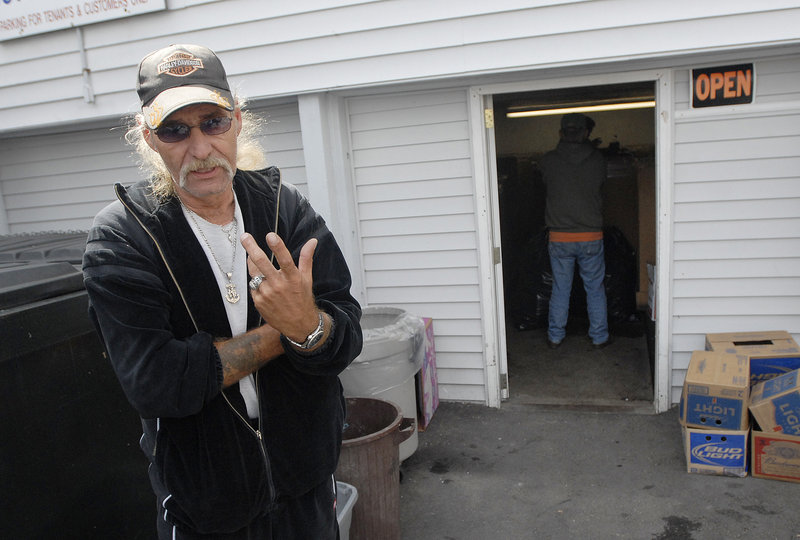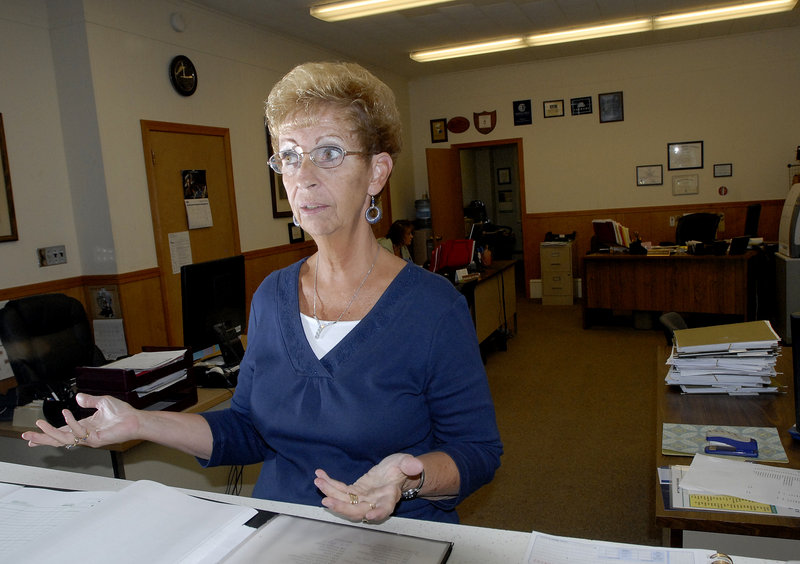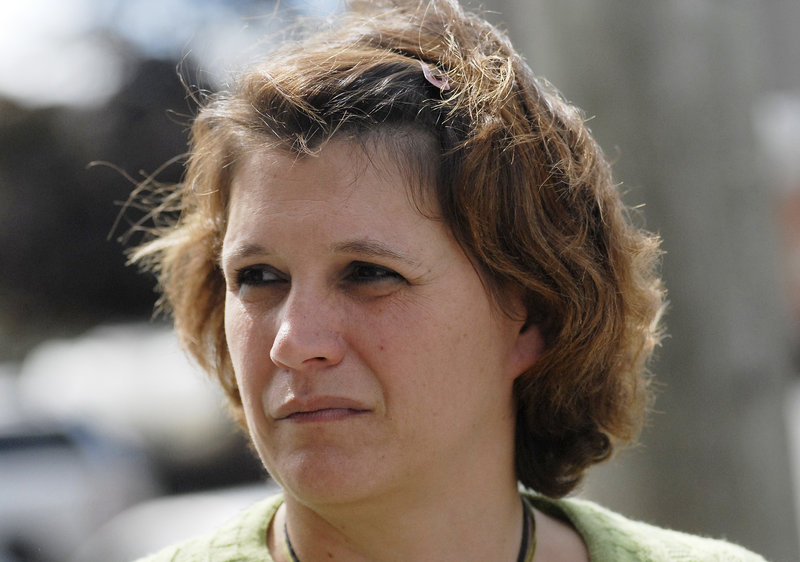From top to bottom, Maine is a state of Cyrs, Pelletiers, Ouellettes and Daigles — not to mention Michauds, Gagnons, Dumaises and Lausiers.
More Mainers identify themselves as having French heritage than any other, according to the latest census data, with 267,000 claiming a Franco background in a state with roughly 1.3 million people.
Though by no means homogenous, the “Franco vote” is courted by politicians, including this year’s contenders for the Blaine House. And one candidate — Republican Paul LePage of Waterville — puts a spotlight on the Franco vote by dint of his own heritage.
In televised debates, LePage has given parts of opening statements in French. His acceptance speech after he won the GOP primary in June included some “merci beaucoups.” And he raised the specter of discrimination that many older Francos have felt when he said this summer that Democratic operatives have suggested he’s unfit to be governor because he’s a French Catholic — a claim he failed to substantiate, and which raised an uproar in the campaign.
Adding to the political-demographic brew is the fact that, even though Francos are the largest ethnic group in the state, Maine has not had a Franco governor since the 1800s. The prospect of having a Franco-American governor is an additional factor in this race, said Brent Littlefield, a Maine native who’s a political consultant to the LePage campaign.
“That’s one more wrinkle to the campaign, (making it) an exciting one for folks that would love to see that happen,” he said.
“Paul is very proud of his heritage, he’s proud to carry the name LePage. I think he realizes that he shares the feelings of many other Maine people who come from a Franco-American heritage, that it would be great to have a Maine governor that shares those values.”
Franco-Americans are tracking closely to the general population in picking a favorite for governor.
In The Maine Poll, a survey done in mid-September by MaineToday Media with the Portland-based polling firm Critical Insights, LePage had 33 percent of the Franco vote. Democrat Libby Mitchell had 31 percent, followed by independents Eliot Cutler with 14 percent, Shawn Moody with 2 percent and Kevin Scott with 1 percent.
Twenty-one percent of Franco-Americans had not made up their minds about a candidate at the time of the poll.
While LePage has openly courted the Franco vote, he hasn’t been the only one.
In the Democratic primary, Rosa Scarcelli had a French radio ad that featured a Franco personality who is well known in Lewiston.
In late July, as the French Catholic brouhaha was unfolding, Democrat Libby Mitchell put out a list of roughly 50 Franco community leaders from across the state who were endorsing her. In the release, Mitchell gave a nod toward early Franco immigrants’ “strong set of family values, a belief in hard work, and a toughness that has become synonymous with Maine,” and noted that in 2008, she had received the highest honor that Augusta’s Le Club Calumet bestows on non-Francos.
So is there such a thing as the “Franco vote?”
“One thing we can say with absolute certainty is politicians behave as if there is — I think they’re right on this,” said Mark Brewer, a political science professor at the University of Maine. “Politicians behave in a certain way because they believe it will appeal to a certain group of people.”
As they try to figure out how to win elections, politicians consider issues in terms of what they can do to appeal to certain groups, to build support across groups, said Brewer. In Maine, one of the first groups politicians think about in those terms is the Francos, he said.
There are broad themes that may resonate with Francos, he said. Some may still feel the legacy of discrimination, or of being looked at as less than full participants in the political process, he said. Some politicians may look at the similarities between areas where Francos are clustered to appeal to common economic issues.
Communities with large Franco populations in southern Maine include Biddeford, Lewiston, Auburn, Brunswick, Bath and Augusta. In the north, the St. John Valley remains a strong French enclave, bolstered in part by the Canadian communities across the river.
Chris Potholm, a pollster and a professor of government at Bowdoin College, said he believes Francos have been an important political group for more than 60 years in Maine.
“I’m absolutely confident that, going back to 1948, the Franco-American vote is the key swing vote,” said Potholm.
The Franco vote was mainly pro-Democrat before 1972, said Potholm. Francos were small business owners and millworkers, and lined up politically against the big businessmen and mill owners, he said.
In 1972, the state got rid of the “big box,” a ballot checkoff that allowed voters to vote the ticket — marking the big box counted as a vote for all members of one party. With the big box off the ballots, Francos looked at each candidate, and that group was put in play politically, said Potholm, not necessarily pegged to one party.
Bill Cohen was among the first Republicans to court the Francos, actively campaigning in strongholds such as Lewiston. He defeated Elmer Violette in 1972 to win the 2nd Congressional District seat, said Potholm, who was Cohen’s campaign manager.
Potholm said he has been polling on the Franco vote since 1972, and that group consistently makes up 18 percent to 20 percent of the electorate. But it’s not a bloc vote, said Potholm, and it can be fractious, even within communities.
St. John Valley’s Francos — Acadians — are a different group from the Quebecois Francos who dominate southern Maine. Potholm notes in his book “The Splendid Game” that that difference played a factor in the 1972 race, as southern Maine’s Francos didn’t automatically line up behind Violette, a Van Buren native.
And, Potholm and others said, a French name doesn’t necessarily bring French votes.
“Message trumps ethnicity in the Franco areas,” said Potholm.
Cohen led the way into Franco territory for Republicans, said Potholm. Olympia Snowe, David Emery and John McKernan all followed him, focusing on small business concerns that spoke to Francos.
In this year’s gubernatorial election, Potholm predicts that Mitchell and LePage will enjoy strong Franco support. LePage may get more of the French vote than a Republican normally would, he said.
“But that’s not necessarily going to be because he’s Franco, … his message is angry, dissatisfied with government, things are going bad. His message resonates,” said Potholm. “Think of all the small business Francos. To them, the government and the incumbency that represents government is often something that brings them bad news, not good news.”
Mitchell and LePage are both speaking to issues that will help them maintain Franco voters in their parties, he said, which makes it difficult for the three independents on the ballot — Eliot Cutler, Shawn Moody and Kevin Scott.
Francos broke for independents James Longley and Angus King, Potholm noted. The support of urban Francos and small-town Republican Francos made the difference in those cases, he said.
Cutler’s campaign manager, Edward “Ted” O’Meara, said he believes his candidate opened the first campaign office in the Lewiston-Auburn area. It’s primarily an important part of the state, O’Meara said, and it’s a Franco-American stronghold. The Cutler campaign isn’t targeting Francos, or any other group, said O’Meara.
“We’re going after all voters; Eliot’s message resonates with all voters,” he said.
As to the idea that independents may not be able to peel off Francos from Mitchell or LePage, O’Meara said, “we’re not conceding any group of voters in the state to anyone.”
Moody said that as an independent candidate, he’s going after that vast bloc of unenrolled voters in Maine, and is trying to pick up Republican and Democratic voters, regardless of ethnicity.
He also noted that his business, Moody’s Collision Centers, has had an operation in Biddeford for close to eight years, and recently opened one in Sanford. That, he said, helps promote his name recognition. And a lot of his employees at those locations are from the Franco community.
“We’re pretty entrenched in that local area,” said Moody.
Douglas Hodgkin, professor emeritus of political science at Bates College, said a variety of factors would influence Franco voters.
“It’s not a monolithic vote,” said Hodgkin, “and it will depend on the interaction between ethnicity of candidates, party affiliation of candidates and the values the voter holds.”
He said blatant attempts to appeal to the Franco vote may backfire.
Longtime legislator John Martin of Eagle Lake said the French vote isn’t as clearly definable as it once may have been.
“I don’t think the French name has an appeal to the French,” said Martin, one of the state’s top Democrats and a Franco representing a Franco-heavy area. “I think Franco-Americans in Maine have assimilated more into the general populace.”
Laurent Gilbert, the mayor of Lewiston, said many politicians come to his city to court the French vote, and “then they tend to forget about us.”
Franco-Americans won’t vote for someone just because they have a French name, said Gilbert, a Democrat who said he’s supporting Cutler.
“People are independent; they will analyze candidates and make a decision,” said Gilbert. “I think people are smarter than to just simply vote for someone because of one’s ethnicity.”
Several Franco-American voters in Biddeford echoed Gilbert’s hypothesis.
“Race does not matter, ethnicity does not matter,” said Carol Binette, office manager at the Ruben-Fortier & LaCourse Agency. “I look at the candidates, I go by the person, the views.”
Jerry Roy worked in the area’s textile mills for 30 years and is now self-employed, doing odd jobs to get by. Issues he would like to see addressed include education as a priority and help for people who need it, like the homeless.
Ethnic background?
“It shouldn’t matter t’all,” said Roy. “We have a black president, don’t we?”
Maryann (Leflamme) Benedict of Saco said she has heard people say they support politicians based on what they look like, or their ethnicity. Benedict said neither is a factor in her voting. She’s looking for a candidate who will lower taxes, protect state rights, reduce the size of government and generally “look out for the people.”
“I look more to the views than what the ethnicity is,” she said.
Earl Rancourt of Waterville said he didn’t see ethnic background — or political persuasion — influencing people’s decision to vote for LePage, who is Waterville’s mayor.
“I can’t believe that many Franco-Americans will vote for LePage simply because he’s of Franco-American descent, any more than Democrats will not vote for LePage because he’s not a Democrat,” Rancourt said. “They’re going to look at his biography and see what he’s done over the years. He’s got a hell of a good trail following him.”
Rancourt, a Democrat, said he plans to vote for LePage.
“I like the way he does things,” Rancourt said. “There needs to be a change.”
Waterville Sentinel Staff Writer Amy Calder contributed to this report.
Staff Writer Matt Wickenheiser can be contacted at 791-6316 or at: mwickenheiser@pressherald.com
Send questions/comments to the editors.





Success. Please wait for the page to reload. If the page does not reload within 5 seconds, please refresh the page.
Enter your email and password to access comments.
Hi, to comment on stories you must . This profile is in addition to your subscription and website login.
Already have a commenting profile? .
Invalid username/password.
Please check your email to confirm and complete your registration.
Only subscribers are eligible to post comments. Please subscribe or login first for digital access. Here’s why.
Use the form below to reset your password. When you've submitted your account email, we will send an email with a reset code.